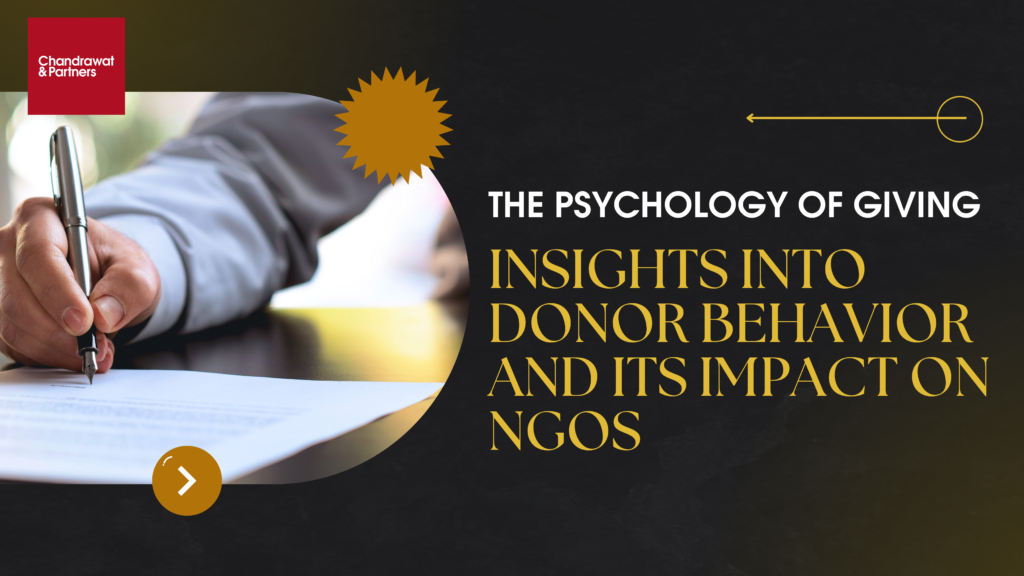Share :
Introduction
The act of giving is a fundamental and intrinsic element of human nature, influenced by a myriad of psychological, social, and emotional factors. In the context of Non-Governmental Organizations (“NGOs”), unraveling the intricacies of the psychology of giving becomes not only a captivating exploration but also a vital consideration for the longevity and efficacy of these organizations. By dissecting the intricate interplay of human emotions, values, and societal influences, a deeper understanding of the psychology of giving emerges, providing valuable insights that can inform strategies for engagement, fundraising, and the overall impact of NGOs dedicated to creating positive change.
The Altruistic Drive
At the core of giving lies the altruistic drive, a fundamental aspect of human nature. The desire to contribute to the well-being of others stems from an innate sense of empathy and compassion. Whether it’s responding to a natural disaster, supporting a community project, or aiding a social cause, donors often feel a sense of fulfillment and purpose in knowing they are making a positive difference. Altruism, driven by a genuine concern for others, serves as a powerful motivator that prompts individuals to engage with NGOs and support their initiatives.
Emotional connection and identification
One of the key factors influencing donor behavior is the emotional connection individuals establish with a cause or organization. NGOs that effectively communicate their mission and impact evoke emotions that resonate with potential donors. Stories of resilience, triumph over adversity, or the transformative power of aid create a powerful narrative that taps into the empathetic core of donors. People are more likely to give when they can emotionally connect with the beneficiaries of their contributions, fostering a sense of shared identity and purpose.
Trust and transparency
Trust is the cornerstone of any successful relationship, and the donor-NGO relationship is no exception. Donors want assurance that their contributions will be used responsibly and effectively. NGOs that prioritize transparency in their operations, openly sharing their financial information, project updates, and impact assessments, build trust with their supporters. The sense of accountability established through transparency not only instills confidence in donors but also enhances the credibility and reputation of the NGOs.
Personal Values and Beliefs
Donors often align their giving with their personal values and beliefs. Whether driven by environmental concerns, social justice issues, or a commitment to education, individuals are more likely to support causes that resonate with their core values. NGOs that clearly articulate their values and demonstrate a commitment to shared principles attract donors who see their contributions as a reflection of their own beliefs, creating a harmonious alignment between the donor and the organization.
Recognition and Social Influence
The psychology of giving is also influenced by the desire for recognition and social validation. Many donors seek acknowledgment for their contributions, whether through public recognition or personal gratitude. Additionally, social influence plays a significant role, as individuals may be inspired to give when they see friends, family, or influencers supporting a particular cause. NGOs that leverage social dynamics and provide meaningful recognition foster a sense of community among donors, encouraging continued engagement and support.
Impact and Tangible Outcomes
Donors are increasingly motivated by a desire to see tangible outcomes resulting from their contributions. NGOs that can effectively communicate the impact of their projects and demonstrate real, measurable results are more likely to attract and retain donors. Providing concrete evidence of positive change reinforces the idea that individual contributions matter and can make a meaningful difference in the world. NGOs should, therefore, invest in robust monitoring and evaluation processes to showcase the efficacy of their programs.
The Role of Technology
In the digital age, technology plays a pivotal role in shaping donor behavior. Online platforms, social media, and crowdfunding have transformed the landscape of charitable giving, making it more accessible and interactive. NGOs that harness the power of technology to tell compelling stories, engage with donors in real-time, and facilitate seamless donation processes can tap into a broader audience and maximize their fundraising potential.
Conclusion
Understanding the psychology of giving is a nuanced and evolving aspect of the nonprofit sector. NGOs that grasp the intricacies of donor behavior can tailor their strategies to effectively connect with supporters, build lasting relationships, and drive positive change. From tapping into the altruistic drive to fostering emotional connections and ensuring transparency, the dynamics of donor psychology have far-reaching implications for the impact and sustainability of NGOs worldwide. As the landscape of charitable giving continues to evolve, a deeper understanding of the psychology behind it will empower organizations to navigate challenges, innovate their approaches, and inspire a culture of generosity that transcends borders and boundaries
For more information or queries, please email us at
enquiries@chandrawatpartners.com





